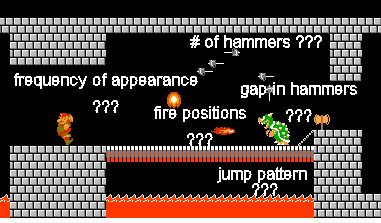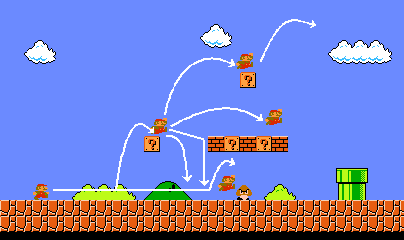KNOWLEDGE is the most complex and prevalent skill among all video games, hobbies, and disciplines across the planet. Every action outside of our automatic biological functions is learned. As babies our eyes are wide open while we slowly build language, motor, and other cognitive skills. With practice, skill, and/or raw talent the power of the human mind can be world changing. After all, human brains created advanced societies, the internet, blogs, and video games in the first place. It's funny that as far as science has progress, our minds are still a great mystery. Getting to the bottom of knowledge skill will simultaneously give us the insight necessary to understand our personal learning styles and to debunk myths about learning.
Remember my article on depth vs complexities? There is no video game that can escape featuring at least one bit/element/piece of data. Because games are interactive systems with rules and goals, each game automatically has at least three elements to learn. In fact, everything from the interactive to non interactive elements in a game are bits of data that make up a game's knowledge base. With that said, we come to the simplest and most fundamental test of one's knowledge skill; recalling stored data. We can test this knowledge with simple quizzes. Here are some examples of data questions on a game we should all know very well by now. Super Mario Brothers.

So many questions.
- How high is Mario's standing JUMP (compared to Small Mario's height)?
- How quickly does Mario accelerate into his maximum running speed (in seconds)?
- How regularly do the Podoboo's appear on screen? What is a Podoboo?
- In 8-4, what is the timing and or frequency that Bowser throws hammers, spits fire, and jumps?
- For a Mario Final Exam visit here.
Even if you're a veteran Mario player, you probably don't know the answers to most if any of these questions off the top of your head. In many ways, this speaks to the relatively small amount of data that must be memorized to successfully play Super Mario Brothers. In other words, you don't have to memorize much outside of which enemies are dangerous, how to defeat enemies, which items are good, and how to maneuver Mario around. Everything else that you need to know to beat the game is easy enough to see, evaluate, and strategize through on the fly.
Beyond the kind of information that can easily be described in clean numerical answers (how many fireballs it takes to kill Bowser/how many points you get from a Super Mushroom), for Super Mario Bros. and all games that feature emergent gameplay there's even more to learn about how the elements, dynamics, and game rules come together. The more emergent the gameplay, the faster this emergent data vastly out races the static, simple data.

So many possibilities and thousands more.
Think about it this way, we all know that you need to JUMP over the Goomba on the first level of Super Mario Brothers. But even this simple action can be executed in hundreds, and maybe thousands of different ways. If each pixel that Mario can move forward changes his position and timing that the JUMP must be executed, then there are already hundreds of different possibilities. Now consider that players can JUMP onto the brick structure and avoid the Goomba or that the player is free to approach the first Goomba at various speeds (by running, walking, or decelerating). The emergent possibilities even in this simple example are more than I'm willing to count. Such is the nature of emergence and knowledge. No one can consciously or subconsciously think of all of the possible variations in an emergent system like Super Mario Bros. Instead, we greatly reduce the amount of brain power required by understanding the rules of the game and creating flexible models in our heads. This involves higher level thinking
A fitting analogy compares the human mind to a computer. Each can receive, encode, store, process, and output data. Naturally, I'm interested in taking a closer look at each step in the human process of acquiring knowledge. To accomplish this task, I'm using the language and framework from neuropsychology.
Consider that long term memory (LTM) is the place we want to store all important data. Unfortunately, most people can't consciously and directly put data into LTM. For this reason, we have to rehearse, study, and use a variety of other techniques to develop our LTM. At some point along this arduous process line, data from our short term memory is converted into long term memory. So we'll start with short term memory (STM) which includes working memory.
The following are aspects of one's knowledge skill.
Short Term Memory
- Memory Span. This is a measure of the amount of information or "bits" of data that you can store in your short term memory. Depending on the type of data, this number can go up or down. Some think the magic number is 7 give or take 2 bits. Regardless, knowing your own capacity to remember information is a critical first step in understanding your limitations as a thinker.
- Coding & Decoding (chunking). Short term memory is distinct yet related to working memory, which involves manipulating and storing data. A common way to increase your ability to store information beyond the "magic number" is to organize the information into more meaningful chunks. This can be done by grouping data like when remembering the 3 parts to a 10 digit phone number, or by using another coding system. Any coding system can work as long as it's memorable and/or meaningful to you.
- Processing Speeds. Even if you're fairly adept at retaining information in your STM and coding/decoding it to increase your capacity, speed is still a factor. Speed according to time or by the number of repetitions is a factor for all cognitive processes. The faster your brain works, the better.
- Hold and Fidelity. Though we don't know why or how our sort term memories decay and fade away, we do know that it does. While memory span measures the capacity to remember information, it's also important to understand how long (hold) and how well (fidelity) short term memory is maintained. Knowing what type of data you hold the longest or what other kinds disappear the easiest is an especially important factor to consider. After all, if most information is transferred from short term to long term, then one's hold and fidelity skills limit one's ability to create long term memories.
Mental Capacity
- Mental Channels. Some theorize that humans are only capable of consciously thinking of one thing at a time. Even if this is the case, like a computer, a powerful mind should be able to multi-task by rapidly switching back and forth between tasks. I describe the ability for someone to take in multiple distinct strings of data or maintain separate simultaneously trains of thought as one's capacity to think in channels. The more channels you have the more you can process simultaneously. Keep in mind that this doesn't necessarily mean you memory span or other cognitive abilities are multiplied.
- Brain Stamina. The brain is a complex organ. Though the exact science of memory storage eludes neuroscientists, we do know that the mind can be over worked. At such a point, one's mental acuity drops sharply. The longer you can go and the more stress you can put on your mind before experiencing this drop the more power to you. Furthermore, the quicker you can recover from a mental "brain lock" the better.
- Loci, Emotion, and Repetition. A few years ago I participated in a memory enhancing program on audio tape by a man named Ron White. Basically, White teaches that we can use our brains like a filing system (Loci/mental locations) For anything we want to remember, we can learn how to encode it in a way that easily allows us to decode and recall the information. White's system uses an action, mental storage location, and a picture as the coding system. Additionally, strong emotional links and stories are ways to strengthen memory.
- Ron White is a U.S. champion of memory. Interestingly, his system is almost identical to the system used by other world record holders for memory from around the world. Whether you use loci, emotional tags, or repetition, the faster and stronger you build your LTM the better.
- Muscle Memory. This is a powerful type of deep memory that works best when performing physical actions with a specific sequence of steps. From driving a car, playing the piano, to walking around a room we use muscle memory to execute complex tasks. The more practice you have executing a physical action from your muscle memory, the more neuronal power you have available for thinking about other things.
- Deleting, Flagging, and Moving Data. When we finally get information into our LTM, often times it becomes incredibly hard to change. If you've ever learned something incorrectly, you may know how difficult it is to get rid of the bad information and replace it with the correct info. Considering that repetition, code systems, and strong associations help build LTM, are the same methods good for deleting LTM? If so, is the effort proportional? Regardless, the less effort it takes you to delete, alter, or move long term memories, the better.
- Izanagi Memory. This is a term that I'm coining to describe the rare and involuntary act of memorizing a piece/string of data (large or small) instantly. Understanding how this instant long lasting memory works is a mystery on top of the mystery that already is neuroscience. We all remember highly emotional moments in our lives. Izanagi memory can happen with or without a strong emotional link. In other words, sometimes you perfectly memorize the most unimportant information that just happens to float through your life.
- Creativity. I want to demystify creativity. Creativity is not a quality that one simply has or doesn't have. In other words, it's not an inherent talent, but a skill that can be learned. Creativity is all about what I call the "box." Contrary to popular belief, being creative isn't always about thinking outside of this box. Often times, coming up with surprising and clever solutions within the cofines of the box is equally creative. It's all about perspective.
With the components of knowledge skill outlined and defined, my next task is to provide examples of how I've used knowledge skills throughout various hobbies and activities in my life. Since this post has already grown quite long, it's up to next time.
Stay sharp.
EDIT: Later, I refined the subfacets of knowledge skill into 6 subcategories: long-term memory, short-term memory, muscle memory, analyze, code/decode (chunking), and channels.